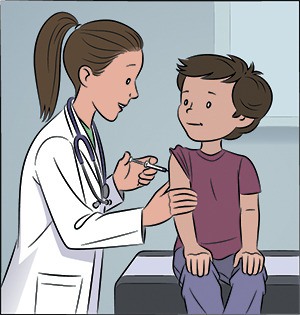The following is written by Meredith Li-Vollmer for Public Health Insider:
“Uh-oh. My little brother just threw up in the hallway.”
It’s not an utterance anyone wants to hear from a dinner guest. Fortunately for my reputation as a cook, it was unrelated to the food I served that evening. The child’s apologetic parents later told me that he had norovirus, a common cause of vomiting and diarrhea, that he had likely acquired at school.
A very bad week at school
That week, the virus swept quickly through his elementary school, the same one my child attended. Parents told horror stories of the children sitting in a row with buckets, waiting for their parents to pick them up. The janitor and teachers reportedly sanitized the desks, chairs, and doorknobs during recess while the older children stood by the doors holding hand sanitizer dispensers, requiring all the children to have a pump before coming back into the classrooms. On a single day during that outbreak, nearly one-third of the student body was absent from school.
According to Dr. Meagan Kay, medical epidemiologist at Public Health, norovirus is highly contagious, and infected people are mostly likely to spread it from the moment they feel ill until at least three days after they no longer have symptoms. Even after this most contagious period, the virus can stay in your system for up to two weeks, so it’s good to be extra diligent about hand washing during those weeks.
Norovirus spreads through:
- close contact with an infected person (such as sharing utensils or taking care of someone who is sick with norovirus),
- touching surfaces and objects that have been contaminated with norovirus, or
- eating foods that have been contaminated with the virus.
“With that ability to spread, you can see how norovirus is a common culprit in outbreaks of vomiting and diarrhea that happen in schools, child care centers, long term care facilities for the elderly, and on cruise ships,” said Kay. “And you can get norovirus more than once in your life. So just because you got it once doesn’t mean you are protected from ever getting it again, unfortunately.”
Feels like food poisoning, but it’s probably not the food
Although people often attribute symptoms of norovirus to food poisoning, it’s often not the food but the food handler that’s causing the illness. If the food handler has been sick with norovirus, they can contaminate food, especially foods that are undercooked or served raw, like produce.
“Most people aren’t tested for norovirus, so we don’t have exact figures for actual cases. But the majority of foodborne illness outbreaks we investigate are likely norovirus,” said Kay.
In praise of bleach
As contagious as norovirus is, it’s not inevitable that you will get it. Once again, follow the public health mantra and wash your hands with soap and water frequently. Also wash fruits and vegetables thoroughly before eating them, and avoid undercooked foods. And if someone gets sick — like my young dinner guest — make sure you put on gloves and promptly clean and disinfect toilets, sinks, and other areas that may be contaminated with vomit or stool, including removing and washing clothing and linens.
At my dinner party, the parents of the sick child graciously did the initial cleaning, and my husband and I went to town with bleach afterwards. We felt like ticking time bombs for the next few days, just waiting for the telltale nausea. While our daughter was not so lucky (having played with the same X-box controller as the sick child), my husband and I managed to escape that time.
I’ve not always been able to avoid norovirus, and in my experience, the suddenness and, uh, vigor of the symptoms is disconcerting and terrible. But while it may make you feel very sick for a few days, norovirus illness is seldom truly serious. Dehydration can be a problem, especially for the very old or very young, so it’s important to drink plenty of fluids and get rest. And avoid preparing food for others for at least two to three days after symptoms have ended, or you could be held to blame for a very bad dinner party.
More on our website about how Public Health investigates norovirus and facts about norovirus.


